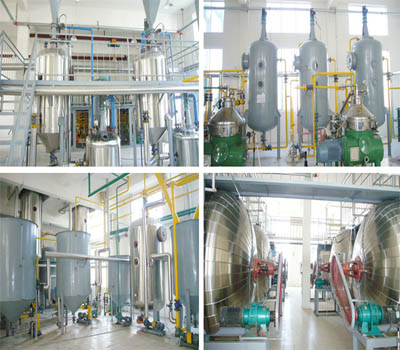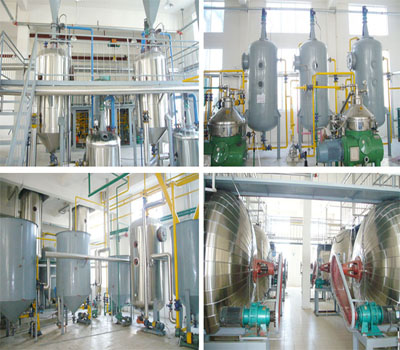The core role of edible oil refinery
As one of the indispensable foods in human daily life, the quality of edible oil is directly related to people’s health and living standards. Edible oil refinery plays a vital role in the whole production process, which is not only the key link of edible oil from raw materials to finished products, but also an important guarantee to ensure oil safety, improve quality and extend shelf life.


First, remove impurities and improve the purity of oil products.
In the initial stage of pressing or extracting, edible oil usually contains some impurities, such as phospholipids, free fatty acids, pigments, waxes and other non-oily substances. These impurities not only affect the appearance of oil products, but also may adversely affect human health. Through refining process, these impurities can be effectively removed, thus improving the purity and quality of oil products.
The refining process usually includes degumming, deacidification, decoloration and deodorization. Each step has its unique function. For example, degumming can remove phospholipids and other colloidal substances, and deacidification can reduce the content of free fatty acids, thus reducing the risk of rancidity of oil products. The implementation of these processes ensures that consumers can obtain safer and higher quality edible oil.
Second, improve the stability of oil products and extend the shelf life.
Untreated raw edible oil is easily affected by light, oxygen and temperature changes, which leads to oxidation reaction and rancidity. The rancid edible oil will not only give off peculiar smell, but also produce substances harmful to human body. Therefore, improving the stability of oil products is one of the important tasks of edible oil refining plant.
Pigments and volatile odor substances in oil can be effectively removed by decoloration and deodorization in refining process. In addition, some refineries will also add antioxidants to further delay the oxidation rate of oil products. These measures work together to keep edible oil fresh for a long time during storage, thus meeting the market demand.
Third, give oil better sensory characteristics.
When consumers choose edible oil, they often pay attention to its sensory characteristics such as color, smell and taste. Untreated raw oil may be too dark in color, pungent in smell or bad in taste, which may affect consumers’ willingness to buy. Through the refining process, edible oil can present a clearer appearance, a milder smell and a more delicate taste.
For example, the decoloration process can remove the pigment from the original oil, making the refined oil appear more transparent or golden color; Deodorization process can remove bad smell and give oil a more pleasant smell. These improvements not only enhance the consumer experience, but also enhance the competitiveness of products in the market.
Fourth, meet food safety standards.
In modern society, food safety has attracted much attention. As one of the foods directly imported, the production of edible oil must strictly abide by the relevant food safety standards. Through advanced technology and strict quality control, the edible oil refinery ensures that every drop of edible oil from the factory meets the national and international food safety requirements.
For example, in the refining process, activated clay or activated carbon may be used to adsorb harmful substances, such as heavy metals or polycyclic aromatic hydrocarbons. In addition, the finished product will be strictly tested to ensure that it meets the specified physical and chemical indicators and microbial requirements. These measures not only protect the health of consumers, but also establish a good brand image for enterprises.
Fifth, support diversified product development.
With the diversification of consumer demand, more and more kinds of edible oil products have appeared in the market, such as olive oil, sunflower oil, soybean oil, rapeseed oil and so on. Different kinds of edible oils may have different refining processes, but refinery can meet diversified market demands by flexibly adjusting production processes.
In addition, some refineries are also committed to developing functional edible oils, such as healthy edible oils rich in Omega-3 fatty acids or vitamin E. These products not only satisfy consumers’ pursuit of healthy diet, but also open up new market space for enterprises.
In a word, the edible oil refinery plays an irreplaceable role in the whole edible oil production chain. It not only improves the purity, stability and sensory characteristics of oil products through refining process, but also ensures food safety and supports the development of diversified products. It can be said that it is precisely because of the refinery that consumers can enjoy high-quality, safe and reliable edible oil. In the future, with the continuous progress of technology and the increase of people’s demand for health, edible oil refinery will play a more important role in the industry and make greater contributions to human diet health.
